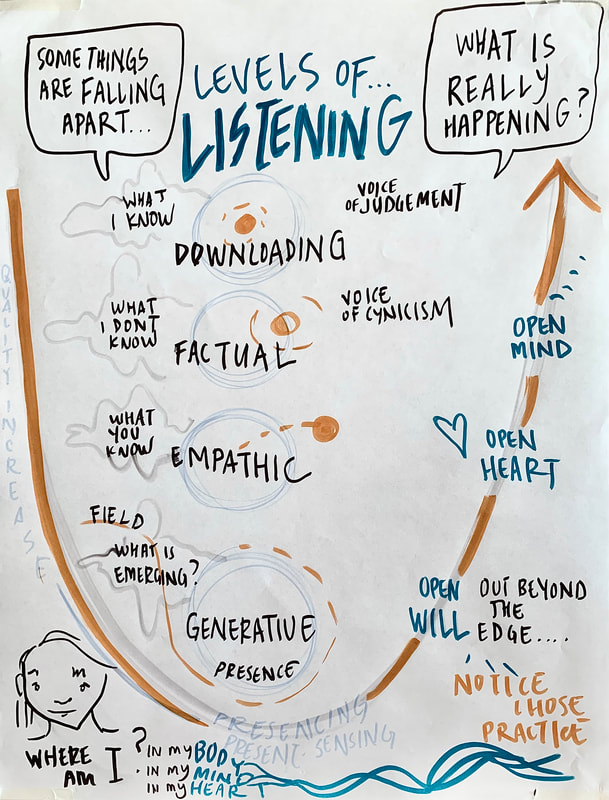Flow
Gallery |
Story of Day 2
|
We were not allowed to talk to any other person during this time. We were rather asked to go out into nature and either think or journal down what came to our minds about this question.
After a Swedish fika break, we were then introduced to the Four Levels of Listening, which opened up new perspectives on how else we could actually listen to one another. We were then sent out again into a Deep Listening Walk with another participant, in which we shared what invited us to “move to the edge” of what we feel called to do. In this way, we had the chance to immediately experience what it means to really listen deeply to another person and how to hear what possibilities lie in that person’s future. Listening to the other person’s future possibilities (generative listening) was a very interesting task. In a beautiful way it made very obvious to me how often we tend to put new information into existing boxes in our own minds, how quickly our brains make immediate judgments and how easy it also is to get lost in the empathy we may feel for a person’s current situation rather than helping them to see what the future could bring.
Before we went into lunch, the afternoon was explained to us, where we would be engaged with the Open Space method, which I consider extremely powerful. The participants had the chance to come up with their own questions, which were all meant to follow the umbrella question of "what do we need to explore now to take our practice further?" Participants who did not raise a question could join other conversations following a few principles such as the law of mobility (also known as the law of 2 feet, which means that one is always welcome to leave a conversation and join another one). I ended up having conversations about integrating AoH methodologies into the public sector and about changes that are needed in Europe’s education systems. However, I know that there were a multitude of other conversations going on at the same time.
After each of these activities, there was always a time to reflect upon the methodology used, and the hosts opened the space for us to ask questions about the methods. I really appreciate the experiential learning methods we use here at the AoH training. Each method we could immediately experience, some of them we could even host ourselves. I feel highly engaged in this training and can’t wait to make more sense of all of this tomorrow, when we see how we can move to action.
After a Swedish fika break, we were then introduced to the Four Levels of Listening, which opened up new perspectives on how else we could actually listen to one another. We were then sent out again into a Deep Listening Walk with another participant, in which we shared what invited us to “move to the edge” of what we feel called to do. In this way, we had the chance to immediately experience what it means to really listen deeply to another person and how to hear what possibilities lie in that person’s future. Listening to the other person’s future possibilities (generative listening) was a very interesting task. In a beautiful way it made very obvious to me how often we tend to put new information into existing boxes in our own minds, how quickly our brains make immediate judgments and how easy it also is to get lost in the empathy we may feel for a person’s current situation rather than helping them to see what the future could bring.
Before we went into lunch, the afternoon was explained to us, where we would be engaged with the Open Space method, which I consider extremely powerful. The participants had the chance to come up with their own questions, which were all meant to follow the umbrella question of "what do we need to explore now to take our practice further?" Participants who did not raise a question could join other conversations following a few principles such as the law of mobility (also known as the law of 2 feet, which means that one is always welcome to leave a conversation and join another one). I ended up having conversations about integrating AoH methodologies into the public sector and about changes that are needed in Europe’s education systems. However, I know that there were a multitude of other conversations going on at the same time.
After each of these activities, there was always a time to reflect upon the methodology used, and the hosts opened the space for us to ask questions about the methods. I really appreciate the experiential learning methods we use here at the AoH training. Each method we could immediately experience, some of them we could even host ourselves. I feel highly engaged in this training and can’t wait to make more sense of all of this tomorrow, when we see how we can move to action.
4 Levels of Listening
Open Space
Question: What do we need to explore now to take our practice further?




